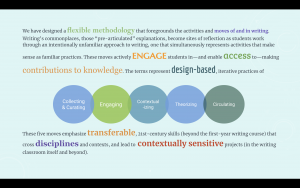Lisa Blansett, associate professor in residence and director of first-year writing in the English Department has received a Scholarship of Learning and Teaching grant from the College of Liberal Arts and Sciences.
Blansett will work with Alex Gatten, the associate director of first-year writing, and Kathryn Warrender-Hill, assistant director of first-year writing on this project. The group will evaluate the implementation of a novel first-year writing curriculum that develops students’ metacognitive skills.
Metacognition, or an awareness of one’s own thinking and learning, is an important part of the learning process. Developing these skills will help students become better, more confident writers and learners.
Metacognition begins when students activate prior knowledge. This curriculum will reframe their prior knowledge about writing and composition and go through a defamiliarization process. This process will introduce students to a new vocabulary for writing that focuses on the cognitive and embodied activities of writing.
“We introduced a new approach to writing with a new vocabulary so all students would have the same ground to build on,” Blansett says. “The terms we’re using represent acts in a writing process, but they reframe the work of writing in ways that ask students to examine the materials they are building their projects with.”
The project will focus on five key practices: “collecting and curating,” “engaging,” “contextualizing,” “theorizing,” and “circulating.”

“Collecting and curating” includes collecting data and performing primary or experiential research to create a meaningful assemblage of information. “Engaging” includes activities like active reading and participating in and contributing to public discussions. “Contextualizing” asks students to research the field, use critical sources, and synthesize multiple perspectives on a question. “Theorizing” involves building new approaches, articulating new connections, and creating knowledge. Finally, “circulating” includes activities such as presenting or publishing ideas, interacting with an audience, and examining the consequences of the broad circulation of words and ideas.
These activities represent experiential process all skilled writers use in a wide range of writing situations. This approach will encourage students to reframe their thoughts and assumptions about writing and reevaluate their own writing practices.
The reframed first-year writing experience will provide students with widely transferable 21st– century skills.
“We want students to gain experience with complex problem-solving and to practice cognitive flexibility as well as other transferable skills the World Economic Forum identifies,” Blansett says.
Another major goal of the project is to provide equitable access to the intellectual processes students need to craft sophisticated writing. This addresses the persistent inequality in literacy among students at UConn and in society more broadly.
Blansett and her colleagues will evaluate the success of the program based on instructor and student feedback, surveys, and class work.
The team will spend the summer developing activity logs, pre- and post-surveys, interview questions, and teaching materials. They will recruit a group of students to participate in the research at the beginning of the Fall 2021 semester.
Through interviews, surveys, and artifacts collected before and after the implementation of this program, the researchers will look for evidence that students developed an awareness of and skills for metacognitive practices in writing.
Blansett hopes this student-centered experiential learning process will bolster student’s experience in the first-year writing program which is designed to help introduce students to the demands of a college education at UConn.
Furthermore, this research will have implications beyond UConn as it contributes to the growing body of scholarship about best practices for writing program design.
This work will provide new ways for addressing student knowledge creation through writing at UConn, tied crucially to strategic plans for innovative teaching and undergraduate research, while also addressing national conversations about student engagement, active learning, and equity in writing instruction.
UConn’s First-Year Writing program has a unique curriculum that has the opportunity to change and contribute to national thinking about the role and structure of first-year writing at universities.
Blansett holds a Ph.D. from the University of North Carolina, Chapel Hill. Her research interests include composition and rhetoric, digital literacies, writing theory and practice pedagogy, gender studies, race in eighteenth-century Caribbean literature, and restoration and eighteenth-century literature.



